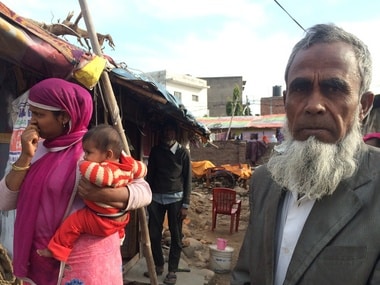Editor’s note: Over 40,000 Rohingya Muslims live in India as refugees — thousands of them in Jammu and Kashmir. The Indian government has recently decided to deport them. In the first part of a two-part series, Firstpost speaks to these people without a State and brings to light their harrowing tales. Srinagar: Many Rohingya Muslims might have fled Myanmar and sought refuge in India, but news from back home — of their brethren being persecuted — never fails to send shivers down their spines. Case in point: The United Nations (UN) recently dubbed the Myanmar government’s self-proclaimed security operation as a case of “ textbook ethnic cleansing”. [caption id=“attachment_4038753” align=“alignleft” width=“380”]  A Rohingya Muslim and his family in Jammu. Image courtesy: Safeena Wani[/caption] Mohammad Hussein, 45, is one such refugee. Hussein, who reached Jammu in August 2016 with his wife, sons and daughter, was horrified to learn of the deaths of his uncle, aunt, nieces and cousins amidst fresh violence in Myanmar. His 26-year-old cousin Harun, who managed to cross the border and seek shelter in Bangladesh’s Kutupalong Refugee Camp, gave him the sorrowful news over the phone. Hussein and his family took 20 days to reach India. They spent a week in a Bangladesh refugee camp — near the coastal city of Cox’s Bazar — snuck into West Bengal through the Amtala border and arrived in Jammu’s Bathindi. Hussein, speaking in broken Urdu, said the journey was arduous. He said police and other security forces at the Bangladesh border and in West Bengal asked for bribes to let refugees in. Hussein said he makes a living as a rag picker. His cousin Harun introduced Firstpost to other refugees. They too, told a similar tale: Thousands of displaced persons marching for weeks — up hills, through muddy ravines, woods and wading through filthy water — reaching the refugee camp in Bangladesh dehydrated, starving and bone-tired. Kulsum Bibi is around 40 years old. She worked as a farmer back home: Maungdaw village. Harun, translating for Bibi, told Firstpost she fled her home in the middle of the night after a raid by the Myanmar Army. Though she managed to grab her younger son and flee through the paddy fields, her husband and other two sons were not so lucky. The army caught them and hacked them to pieces. Bibi said she saw her tribe being butchered. Women being raped. Houses set aflame. “We are done,” she said. “Everything is gone.” Hashmat Ali, a 33-year-old farmer from Rakhine, said he fled his home after Myanmar security forces began rounding up people. Snatching them from their homes. He said the military lined them up: Husbands. Wives. Sons. Daughters. Young and old. They demanded a ransom in exchange for sparing their lives, Ali said. Those who had nothing left to give were butchered. Ali and his brother managed to escape. Somehow. But those who couldn’t were burnt alive in their homes. Talk to anyone at Bangladesh’s Kutupalong Refugee Camp and you’ll get many similar gut-wrenching stories. Hassan, a teenager, witnessed his mother being raped by security forces. Harun said the boy sits in the refugee camp. Alone. Frozen with grief. Speaking to no one. Tasleema is a young woman whose husband was burnt alive. Yusuf’s daughter was abducted. He never saw her again. Zainab Khatoon, another woman at the refugee camp, said the military came to her village on 25 August. They killed five people, including her son. “They set our houses on fire before they left,” she said. “We managed to escape.” She paused. “Actually, we’re already dead. They killed us.” A United Nations report — compiled on the basis of interviews with Rohingya Muslims who have fled to Bangladesh since last October — contains many such horrific first-person accounts. The report concludes by raising serious concerns about the “purposeful policy designed by one ethnic or religious group to remove by violent and terror-inspiring means the civilian population of another ethnic or religious group”. A people without a State Rohingya Muslims are widely regarded as the world’s most persecuted minority. Myanmar has 11 lakh Rohingya Muslims. More than 80 percent of them live in Rakhine State. While Rohingya Muslims claim their ancestors have been in that region since the 8th Century, the Buddhist-dominated Myanmar government does not recognise them as citizens. It considers them illegal immigrants from Bangladesh. Rohingya are excluded from the country’s education system and healthcare, they aren’t allowed freedom to move as they please, marry who they please and are even forcibly sterilised. Torture at the hands of Myanmar’s military drives them across the border in the thousands: To Bangladesh and India. But Bangladesh has refused to accommodate them. And now India has announced that it will deport them. Unwanted at home and unwelcome by their neighbours, they are, in essence, a people without a State. The crackdown on the Rohingya was triggered by an attack on Myanmar’s police posts near its Bangladesh border on 9 October, 2016. Nine police officers were killed. The Myanmar government believes the attack was coordinated by the Rohingya. Myanmar security forces responded by unleashing a torrent of violence on the Rohingya. Such was their brutality that more than a dozen Nobel laureates were moved to write an open letter to the United Nations Security Council, urging it to intervene and end the “ethnic cleansing and crimes against humanity”. On 25 August, a similar attack on police posts in Myanmar claimed the lives of 12 police officers. Which led to yet another crackdown, forcing 3 lakh refugees to flee the country. Most of them ended up in Bangladesh. In refugee camps, perhaps. Alive, but not really living. Safeena Wani is a Srinagar -based freelance writer and a member of 101Reporters.com_, a pan-India network of grassroots reporters._
Many Rohingya Muslims might have fled Myanmar and sought refuge in India, but news from back home — of their brethren being persecuted — never fails to send shivers down their spines.
Advertisement
End of Article


)




